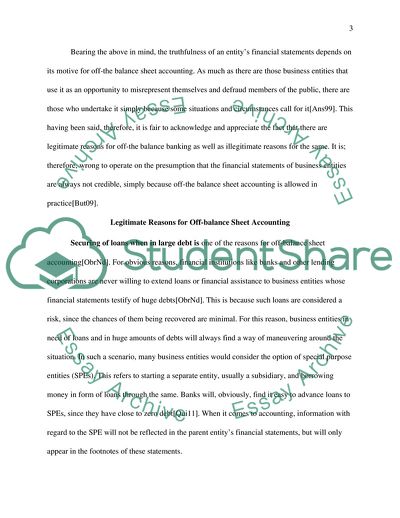Cite this document
(QUESTION Financial statements often fail to faithfully represent the Essay - 1, n.d.)
QUESTION Financial statements often fail to faithfully represent the Essay - 1. https://studentshare.org/finance-accounting/1858951-question-financial-statements-often-fail-to-faithfully-represent-the-economic-substance-of-companies-because-many-assets-and-liabilities-are-legitimately-allowed-to-be-reported-as-off-balance-sheet-items-required-discuss-to-what-extent-you-agree
QUESTION Financial statements often fail to faithfully represent the Essay - 1. https://studentshare.org/finance-accounting/1858951-question-financial-statements-often-fail-to-faithfully-represent-the-economic-substance-of-companies-because-many-assets-and-liabilities-are-legitimately-allowed-to-be-reported-as-off-balance-sheet-items-required-discuss-to-what-extent-you-agree
(QUESTION Financial Statements Often Fail to Faithfully Represent the Essay - 1)
QUESTION Financial Statements Often Fail to Faithfully Represent the Essay - 1. https://studentshare.org/finance-accounting/1858951-question-financial-statements-often-fail-to-faithfully-represent-the-economic-substance-of-companies-because-many-assets-and-liabilities-are-legitimately-allowed-to-be-reported-as-off-balance-sheet-items-required-discuss-to-what-extent-you-agree.
QUESTION Financial Statements Often Fail to Faithfully Represent the Essay - 1. https://studentshare.org/finance-accounting/1858951-question-financial-statements-often-fail-to-faithfully-represent-the-economic-substance-of-companies-because-many-assets-and-liabilities-are-legitimately-allowed-to-be-reported-as-off-balance-sheet-items-required-discuss-to-what-extent-you-agree.
“QUESTION Financial Statements Often Fail to Faithfully Represent the Essay - 1”. https://studentshare.org/finance-accounting/1858951-question-financial-statements-often-fail-to-faithfully-represent-the-economic-substance-of-companies-because-many-assets-and-liabilities-are-legitimately-allowed-to-be-reported-as-off-balance-sheet-items-required-discuss-to-what-extent-you-agree.


